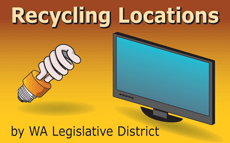SB 5144, providing for responsible environmental management of batteries, passed the legislature in April and was signed into law on May 11, 2023. The law requires producers of covered batteries and battery-containing products to participate in a stewardship organization which plans and provides for battery collection and end-of-life management. Under current rules adopted by the Department of...

Battery Legislation
There is currently no federal legislation regulating the management of batteries at the end of life, but a number of states have passed and attempted to pass legislation.
A Letter of Support from Whatcom County Public Works (PDF), March 2013.
A Letter of Support from the City of Vancouver (PDF), March 2013.
A Resolution of the Douglas County Commissioners (PDF), February 2013.
Assembly Bill 488, would require producers of household batteries, including primary and rechargeable batteries "weighing two kilograms or less," to develop, finance and implement a battery stewardship program.
HB 2938 would prohibit knowingly disposing of rechargeable batteries as solid waste and require retailers and rechargeable battery manufacturers to establish a recycling program. Heard Feb. 28 in the House Committee on Energy and Environment.
The Washington Small Rechargeable Battery Stewardship Act, House Bill 1364 and Senate Bill 5457, introduced in 2013 at the initiative of the rechargeable battery industry, Call2Recycle, would have required rechargeable battery brand owners (manufacturers) to fund and manage a...
A Letter of Support from Whitman County Department of Public Works (PDF), December 2012.
A Resolution of the City of Seattle, December 2012.
